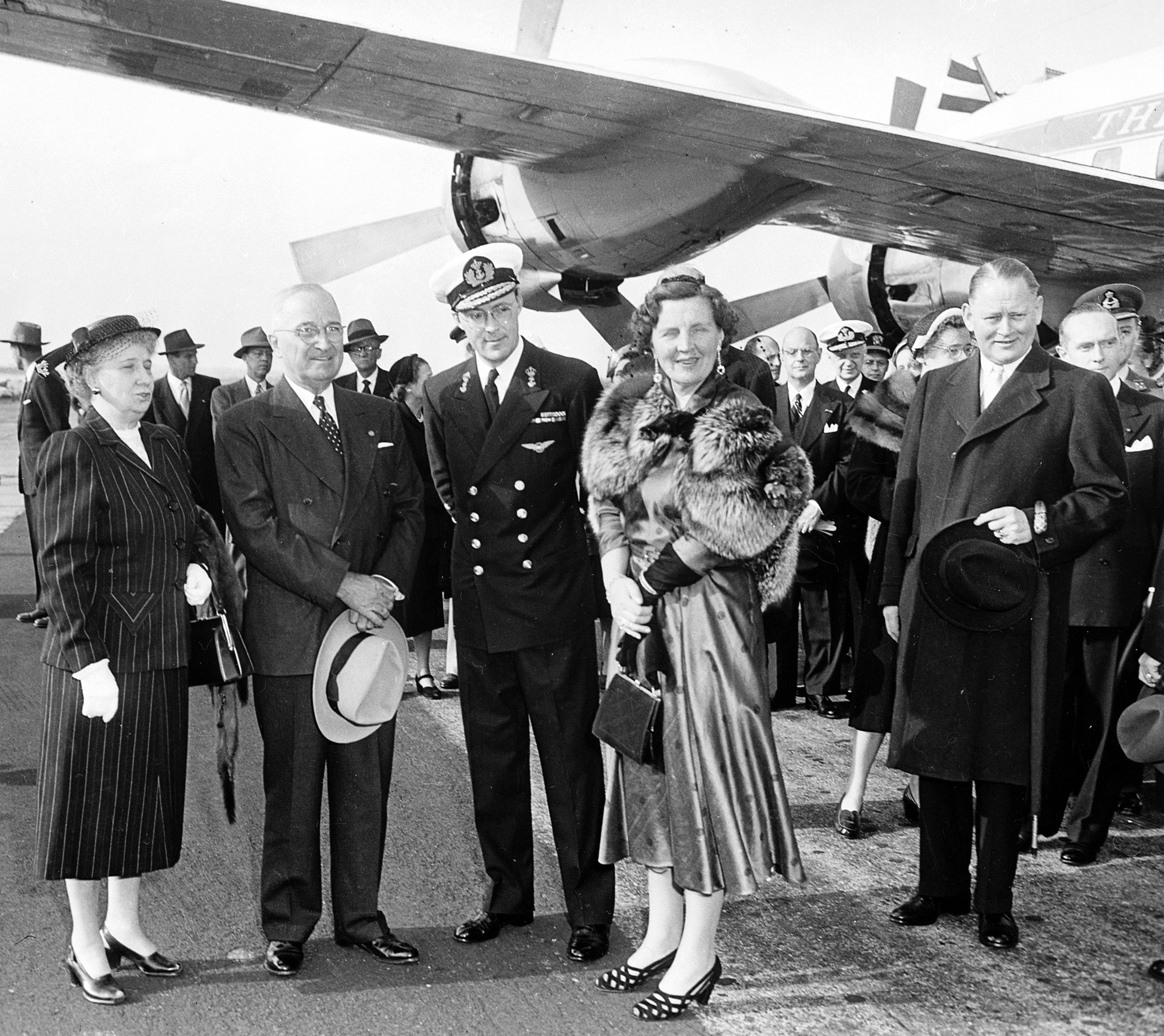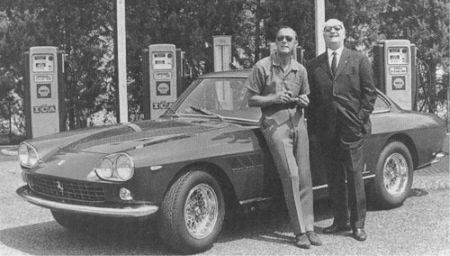Reporting For Duty
It looks like you're new here. If you want to get involved, click one of these buttons!
Quick Links
Categories
In this Discussion
The largely unknown 'Ian Fleming - Prince Bernhard of The Netherlands'-connection
The largely unknown 'Ian Fleming - Prince Bernhard of The Netherlands'-connection
He was considered one of the most flamboyant, charming and funny members of the Dutch Royal Family: Prince Bernhard of Lippe-Biesterfeld, Prince of The Netherlands and prince-consort of Dutch Queen Juliana of Orange-Nassau, Queen of The Netherlands. By: Gert Waterink (Gustav_Graves)
Together with Queen Juliana they had four children (and two other illegitimate daughters from a certain Ms. Bielefeld and from French model Hélène Grinda), including the current Dutch Queen Beatrix.

Prince Bernhard in 1942, made in London
What many people, and especially Bond fans, do not know, was the fact that Prince Bernhard worked for the British Intelligence Services during World War II. The Second World War forced the Dutch royal family to live in exile in London. For Prince Bernhard it was hard to find an honourable job in the United Kingdom, as he was of German origin. The War Admiralty, and later General Eisenhower's Allied Command offices, could not fully trust him, thus a full screening of Bernhard's past life was required.

Prince 'Lippe' in British naval uniform, next to US President Harry Truman
That screening was actually executed by the creator of James Bond, Ian Fleming, on behalf of Winston Churchill. After Fleming's screening was positive and no convincing relation of Bernhard with the NAZI's and the Hitlerjugend could be found, he was permitted to work in the Allied war planning councils.
Ian Fleming, who personally knew Bernhard from their war efforts and from luncheons in the Lincoln's Inn Hotel in London, based some features of his fictional character James Bond on Bernhard.

One of their luncheons is explained in Andrew Lacett's biography of Ian Fleming. It actually resulted in a life-threathening event, as the entrance and a 200-year-old staircase was destroyed during the bombardment of London by the Nazi's. No one was injured. Prince Bernhard then lowered himself 20 feet to the lowest bit of staircase standing, and then said staunchly and with a mixture of Dutch/British flair, as nothing happened: "Most enjoyable evening!"
During the luncheons, also the famous vodka martini shaken and not stirred was ordered. Especially Berhard liked this rather 'weird' concoction of martini with wodka.
Next to his reputation as a womanizer Prince Bernhard was also well known for his love for fast planes, fast cars and speeding. Prince Bernhard was an avid collector of Ferrari's. His collection included the ones pictured below:
Ferrari 365 GT 2+2:

Prince 'Lippe' together with Enzo Ferrari in 1964 for his brandnew Ferrari 330:

Bernhard's favourite, the Ferrari 500 Superfast Speziale:

And his 'normal' Ferrari, the 356:

One last thing. As you all know, one of the villain's henchmen in the novel and films "Thunderball" and "Never Say Never Again" is named Count Lippe. Ian Fleming knew only one person who was having a great time during World War II, and that was off course Prince Bernhard of 'Lippe'. Hence the inspiration for the name
Most importantly, during interviews on Dutch television, Prince Bernhard admitted he indeed 'liked the James Bond films a lot'. We will can never fully proof if the character of James Bond, besides being based on Fleming's own work as naval intelligence officer, was also partially based on Prince Bernhard of Lippe's life. But the flamboyant and luxury lifestyle of Holland's most beloved Prince, does indeed have a striking resemblance to Bond's lifestyle ;-).
I am not making this up. I have sources to back up the above connection. So for more information about Prince Bernhard of Lippe-Biesterfeld, Prince of The Netherlands and his connection with Ian Fleming, go to: http://books.google.nl/books?id=JLOMsmJ_xoUC&pg=PT25&lpg=PT25&dq=Prince+Bernhard+Ian+Fleming&source=bl&ots=DZiMddxNsY&sig=WXlaR7-48ps-_iR92YUGiziBOd4&hl=en&sa=X&ei=HeDmUNfACq-50AG934DQBQ&ved=0CGoQ6AEwCQ, http://books.google.nl/books?id=JG9T0wvAHQkC&pg=PT159&lpg=PT159&dq=Prince+Bernhard+Ian+Fleming&source=bl&ots=NA0vNCRH3P&sig=aCNfcD9x-PT7COjYfjnyMzkjWBY&hl=en&sa=X&ei=HeDmUNfACq-50AG934DQBQ&ved=0CGcQ6AEwCA and http://en.wikipedia.org/wiki/Prince_Bernhard_of_Lippe-Biesterfeld
And for more interesting information about another Dutch spy who worked for MI6, Peter Tazelaar, during World War II, visit this site. You will now know where the pre-credits-sequence of 'Goldfinger' was inspired on ;-): http://www.rnw.nl/english/article/james-bond-was-dutch
He was considered one of the most flamboyant, charming and funny members of the Dutch Royal Family: Prince Bernhard of Lippe-Biesterfeld, Prince of The Netherlands and prince-consort of Dutch Queen Juliana of Orange-Nassau, Queen of The Netherlands. By: Gert Waterink (Gustav_Graves)
Together with Queen Juliana they had four children (and two other illegitimate daughters from a certain Ms. Bielefeld and from French model Hélène Grinda), including the current Dutch Queen Beatrix.

Prince Bernhard in 1942, made in London
What many people, and especially Bond fans, do not know, was the fact that Prince Bernhard worked for the British Intelligence Services during World War II. The Second World War forced the Dutch royal family to live in exile in London. For Prince Bernhard it was hard to find an honourable job in the United Kingdom, as he was of German origin. The War Admiralty, and later General Eisenhower's Allied Command offices, could not fully trust him, thus a full screening of Bernhard's past life was required.

Prince 'Lippe' in British naval uniform, next to US President Harry Truman
That screening was actually executed by the creator of James Bond, Ian Fleming, on behalf of Winston Churchill. After Fleming's screening was positive and no convincing relation of Bernhard with the NAZI's and the Hitlerjugend could be found, he was permitted to work in the Allied war planning councils.
Ian Fleming, who personally knew Bernhard from their war efforts and from luncheons in the Lincoln's Inn Hotel in London, based some features of his fictional character James Bond on Bernhard.

One of their luncheons is explained in Andrew Lacett's biography of Ian Fleming. It actually resulted in a life-threathening event, as the entrance and a 200-year-old staircase was destroyed during the bombardment of London by the Nazi's. No one was injured. Prince Bernhard then lowered himself 20 feet to the lowest bit of staircase standing, and then said staunchly and with a mixture of Dutch/British flair, as nothing happened: "Most enjoyable evening!"
During the luncheons, also the famous vodka martini shaken and not stirred was ordered. Especially Berhard liked this rather 'weird' concoction of martini with wodka.
Next to his reputation as a womanizer Prince Bernhard was also well known for his love for fast planes, fast cars and speeding. Prince Bernhard was an avid collector of Ferrari's. His collection included the ones pictured below:
Ferrari 365 GT 2+2:

Prince 'Lippe' together with Enzo Ferrari in 1964 for his brandnew Ferrari 330:

Bernhard's favourite, the Ferrari 500 Superfast Speziale:

And his 'normal' Ferrari, the 356:
One last thing. As you all know, one of the villain's henchmen in the novel and films "Thunderball" and "Never Say Never Again" is named Count Lippe. Ian Fleming knew only one person who was having a great time during World War II, and that was off course Prince Bernhard of 'Lippe'. Hence the inspiration for the name
Most importantly, during interviews on Dutch television, Prince Bernhard admitted he indeed 'liked the James Bond films a lot'. We will can never fully proof if the character of James Bond, besides being based on Fleming's own work as naval intelligence officer, was also partially based on Prince Bernhard of Lippe's life. But the flamboyant and luxury lifestyle of Holland's most beloved Prince, does indeed have a striking resemblance to Bond's lifestyle ;-).
I am not making this up. I have sources to back up the above connection. So for more information about Prince Bernhard of Lippe-Biesterfeld, Prince of The Netherlands and his connection with Ian Fleming, go to: http://books.google.nl/books?id=JLOMsmJ_xoUC&pg=PT25&lpg=PT25&dq=Prince+Bernhard+Ian+Fleming&source=bl&ots=DZiMddxNsY&sig=WXlaR7-48ps-_iR92YUGiziBOd4&hl=en&sa=X&ei=HeDmUNfACq-50AG934DQBQ&ved=0CGoQ6AEwCQ, http://books.google.nl/books?id=JG9T0wvAHQkC&pg=PT159&lpg=PT159&dq=Prince+Bernhard+Ian+Fleming&source=bl&ots=NA0vNCRH3P&sig=aCNfcD9x-PT7COjYfjnyMzkjWBY&hl=en&sa=X&ei=HeDmUNfACq-50AG934DQBQ&ved=0CGcQ6AEwCA and http://en.wikipedia.org/wiki/Prince_Bernhard_of_Lippe-Biesterfeld
And for more interesting information about another Dutch spy who worked for MI6, Peter Tazelaar, during World War II, visit this site. You will now know where the pre-credits-sequence of 'Goldfinger' was inspired on ;-): http://www.rnw.nl/english/article/james-bond-was-dutch
^ Back to Top
The MI6 Community is unofficial and in no way associated or linked with EON Productions, MGM, Sony Pictures, Activision or Ian Fleming Publications. Any views expressed on this website are of the individual members and do not necessarily reflect those of the Community owners. Any video or images displayed in topics on MI6 Community are embedded by users from third party sites and as such MI6 Community and its owners take no responsibility for this material.
James Bond News • James Bond Articles • James Bond Magazine

Comments
Ooowh yes, he was a naughty boy as well. Hence the fact that Count Lippe was a bad boy as well in 'Thunderball' :-).
LOL, I completely forgot about this topic hehe. Andrew Lycett's book about Ian Fleming is quite OK actually. Let's see if we can see something of it back in the Sky/BBC America TV Mini-Series.
Indeed. I hope so, too. Andrew Lycett's biography of Fleming is a cornerstone of my collection.
Anyway, did more people find the Dutch Royals-Ian Fleming connection?
Yup, it's nice to know what inspired Ian Fleming. The name's of Goldfinger, Bond and Lippe are all from real-life events.
No man! What makes you think he was??
Ummm, that he was a member of Reiter-SS and also the, ummm, nazi party?
I think Prince Bernard has proven that he actively and forcefully rejected the Nazi's and their evils. He became member of the RAF during World War II no less. The British should show a bit more respect for his services.
Well, depends how you look at it. I mean.....many Germans were member of the NSDAP when they started to become popular in the early 1930's. Very much like today's worries of common people and their votes for right-wing populist parties. It doesn't necessarily make them....'bad people'. But then again, in the UK the Germans are still seen as villains, much more than in The Netherlands.
Uhm, that is not entirely true. Bernhard was for a short member of the SA yes, the predecessor of the SS. Hitler (and Himmler) eventually made the SS more powerful, because the SA was less organized and more of a gentleman's 'motorclub' in comparison to the SS. Also, in the late 1920's and early 1930's many students who became member of a German fraternity, almost immediately were registered as SA-member. Especially in the higher, elite, noble jetset of Germany.
Being member is one thing, but in the end one should be judged on someone's actions. In Nazi-Germany in those days half of the population was a member of the NSDAP (Nazi-Party). Are they all 'wrong' persons who should have been get the death sentence? The most bitter aspect of WW II was the fact that in the end it was never a truly black-and-white, good-vs-evil war.
I mean, one can also say that Churchill should be damned for the fact that he did not sent the entire Royal Navy to Dunkirk to save all 500,000 British soldiers and instead chose to send pleasure yachts to Dunkirk to save only about 30,000 Brits. I mean, war is a dirty thing altogether. I do think however that, since the UK eventually were never occupied by the Nazi's, they have a slightly nastier attitude towards.....Germans....and the European mainland on the whole.
And I'm saying this not as someone who claims he would have resisted, but in fact as the son of a career officer in the Wehrmacht (though never a party member, and someone who spent five years in a Russian prison camp) and his wife, once a small-town BDM leader. I'm glad that I was born more than ten years after the war and never had to make the choice, while being aware what would have been the moral one.
PS/Edit: I've been checking my roots on myheritage.com, and apparently being related to just about everyone in Eastern Westphalia, there is also an illegitimate offspring of the House of Lippe in my ancestry. For what it's worth.